Karnabharam
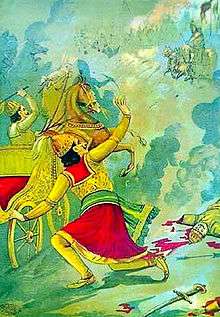
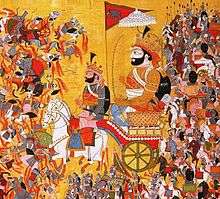
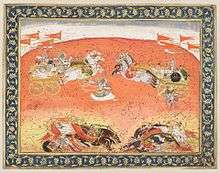
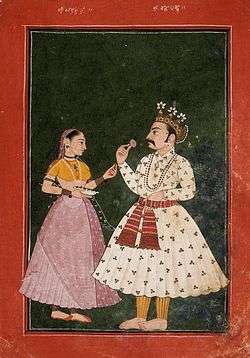
Karnabharam or The Anguish of Karna (literally: The Burden of Karna) is a Sanskrit play written by the Indian dramatist Bhasa. The play describes the mental pain of Karna on the previous day of the Kurukshetra War.[1] Karnabharam is essentially the retelling of an episode of the Indian epic Mahabharata but the story is presented in a different perspective in the play. '
Bhasa
Bhasa is one of the earliest dramatists of the Indian subcontinent. But very little is known about him. Kalidasa once said, "Shall we neglect the works of such an illustrious author as Bhasa?". Bhasa lived around the second century. Most of his plays were lost for centuries.
Karna
Karna was one of the greatest warriors of ancient India as given in the Mahabharatha. He was the king of Anga kingdom. According to Mahabharatha, Karna was the only warrior who had the capacity to conquer the entire world.
Depiction of Karna
The play depicts Karna's mental agony a day before the Kurukshetra War, as he thinks about his past and his faith. The play projects the mortal anguish of a man unsure of his identity. Karnna the protagonist is heroic and pathetic at the same time as he tries to find his place between the mocking and adulation of social forces on one side and the taunting challenges of fate on the other.
The treatment of the play takes it beyond reality, beyond caricature of farce into a realm that transcends the space and time and gets related to the social realities of today. Karna lingers in one’s consciousness as the symbol of Universal man in search of his own self-the ultimate dilemma of existence.
The Plot
The time and space of action is from the eleventh day in the war-field of Mahabharata. The great warrior Karna, the son of Surya is seen distributed and depressed in the war-field instead of being mighty and powerful. The play analyses the reasons.
He is worried of his birth, his caste and his social status. Whether he is the son of Kunthy and Soorya, or Radha and Sutha? The mockery and adulation of the society moulds his person and fate. For a while he is moved by the meaninglessness of the war where men kill each other. He says that irrespective of his victory or defeat, war is a real waste. This vision adds to his turbulence.
Karna tells Salya about the curse given by his Guru, Parasurama. This episode is inacted by correlating the narration of the present with the inacting of the past. The astra advised by Parasurama is found powerless at the needed hour.
The entry of Indra disguised as a Brahmin, follows, who cunningly takes away the divine Kavacha and kundala from Karna. He understands that the whole plot is masterminded by the shrewd Krishna and accepts his fate. The messenger from Indra offers a powerful weapon Vimala which can destroy one among the Pandavas. Accepting the challenge from Arjuna and Krishna the revitalized Karna proceed to this ultimate fate heroically. Thus ends Bhasa’s play Karnabharan.
Sources of the Play
- Shanti Parva. Chapter 3. The story of Karna learning the missile technology from Parasuram. The curse of the guru.
- Vana Parva. Chapter. 310. The visit of Indra and the giving away of the armour and the ear rings in exchange for a magic power.
- Udyogaparva.Chapter 146. Kunti’s request that her children may be spared. Karna’s promise (exception Arjuna)
- Karna Parva: Karna’s march to the battlefield with Salya as the charioteer.
Title of the play
‘Bhara’ or burden is the central theme. The word ‘bhara’ in the title may refer to
- The weight of the armour and the ear rings
- The thought of killing his own brothers.
- The thought of the three curses.
- The thought of his weapons becoming useless at the crucial time.
- The loss of the ear rings and the armour at the crucial time which increased his bhara or responsibility as the commander of the army.
Deviation from the Vyasa Mahabharata
The play has many deviations from the original Mahabharata and all deviations are purposeful.
- Focus on the personality of Karna and his limitless generosity.
- Time of Indra’a appearance. In the play, it happens on the 17th day of the battle. In the Vyasa version, it happens much earlier.
- In the original, Karna demands the Sakti from Indra in return for the gift of Kavacha and Kundala. In the play he refused anything offered in return. (To show Karna in better glamour as a true gift giver).
- In the original, Karna’s father Surya appears in a dream and warns Karna against the cheating of Indra. In the play, this is omitted for dramatic effect.
- Indra sending an angel is also added.
- The original Salya often criticizes Karna harshly and discourages him by quarreling bitterly. But in the play, Salya is a true friend and well wisher of Karna.
Staging
The play was staged in New Delhi in 2001. It was designed and directed by Chandradasan on the basis of a translation by Kavalam Narayana Panicker. The play had a duration of 55 minutes. Malayalam language superhero Mohanlal [2] took the part of Karna.[3][4]
Sun God Surya Bhagavan
Surya is the real father of Karna. Kanra's mother became pregnant from Surya when she was a virgin. She felt ashamed of it, put Karna in a basket and floated him across the river. He was rescued and reared by a charioteer family. A picture of Surya in his chariot is given below:
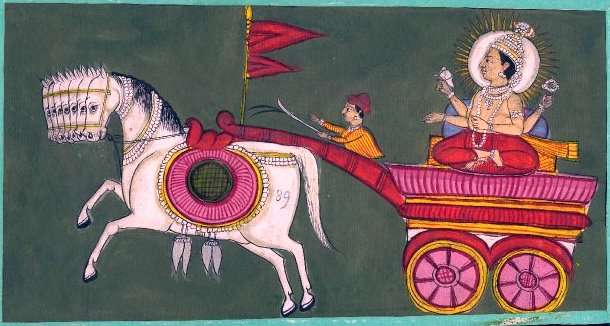
Further reading
- Thirteen Trivandrum plays ascribed to Bhāsa( 2 Vols), translated by H.C.Woolner, Lakshman Sarup, 193
- Māni Mādhava Chākyār (1975), Nātyakalpadruma, Kerala Kalamandalam, Vallathol Nagar
- Dharwadker, Aparna Bhargava (2005). Theatres of independence: drama, theory, and urban performance in India since 1947. University of Iowa Press. ISBN 0-87745-961-4.
- Encyclopaedia of Indian Theatre: Bhasa, by Biswajit Sinha, Ashok Kumar Choudhury. Raj Publications, 2000. ISBN 81-86208-11-9.
- A.D. Pusalker : Bhasa – a study. Munshiram Manoharlal Publishers Pvt. Ltd. New Delhi, India 1968
- V. Venkatachalam : Bhasa (A monograph in the 'Indian Men of Letter Series'), Sahitya Akademi, New Delhi, 1986; Second Edn. 1994; (pp. 16+192) (Translated into Bengali, Gujarati, Kannada and Telugu-Pub. By Sahitya Akademi)
References
- ↑ http://www.indianscriptures.com/scriptures/introduction-of-scriptures/classical-sanskrut-literature/karnabharam
- ↑ http://www.mohanlalonline.com/Content/karnabharam/
- ↑ http://lokadharmi.org/karnabharam.htm
- ↑ http://timesofindia.indiatimes.com/bombay-times/Karnabharam-comes-to-town/articleshow/1586278485.cms